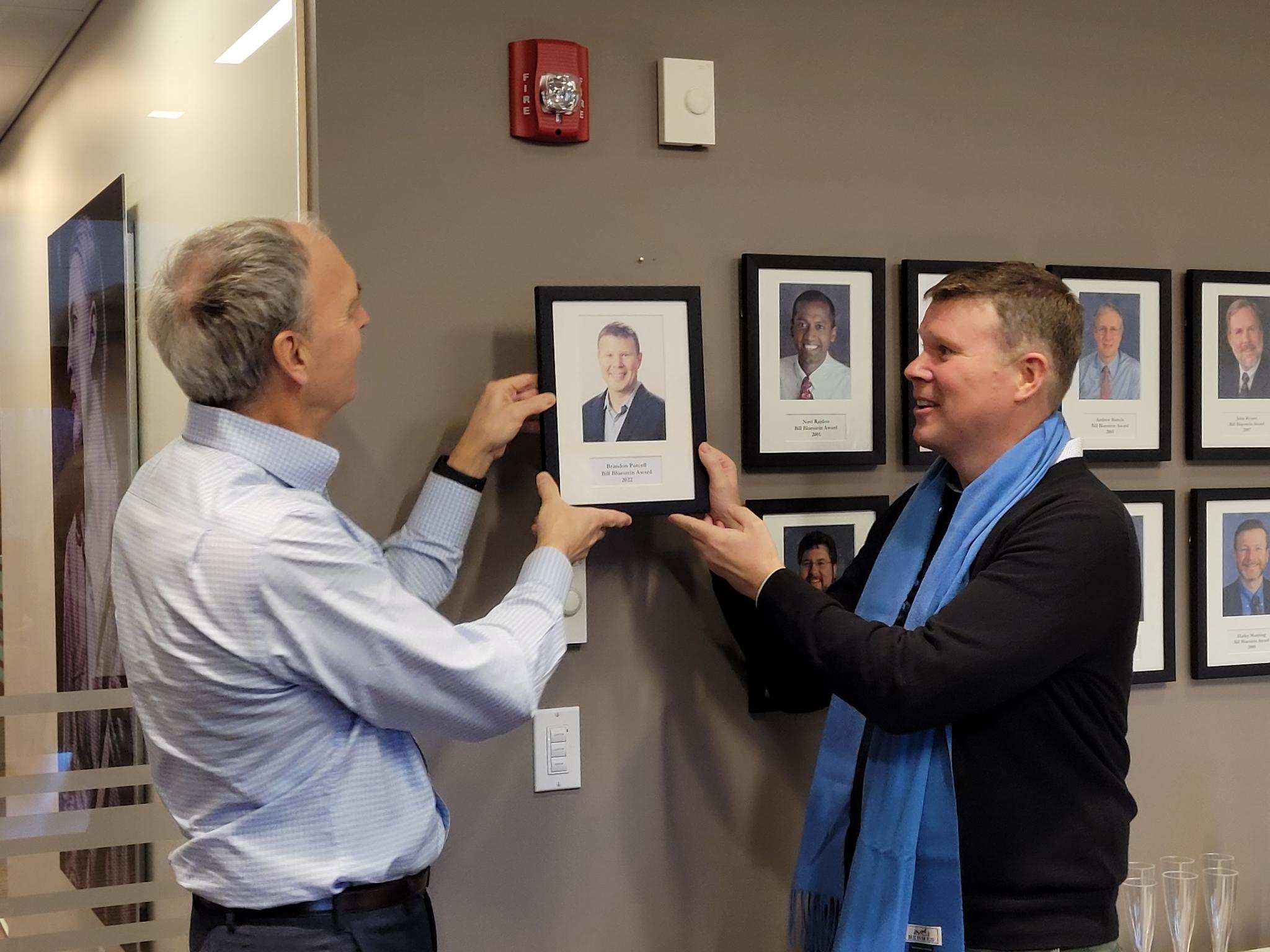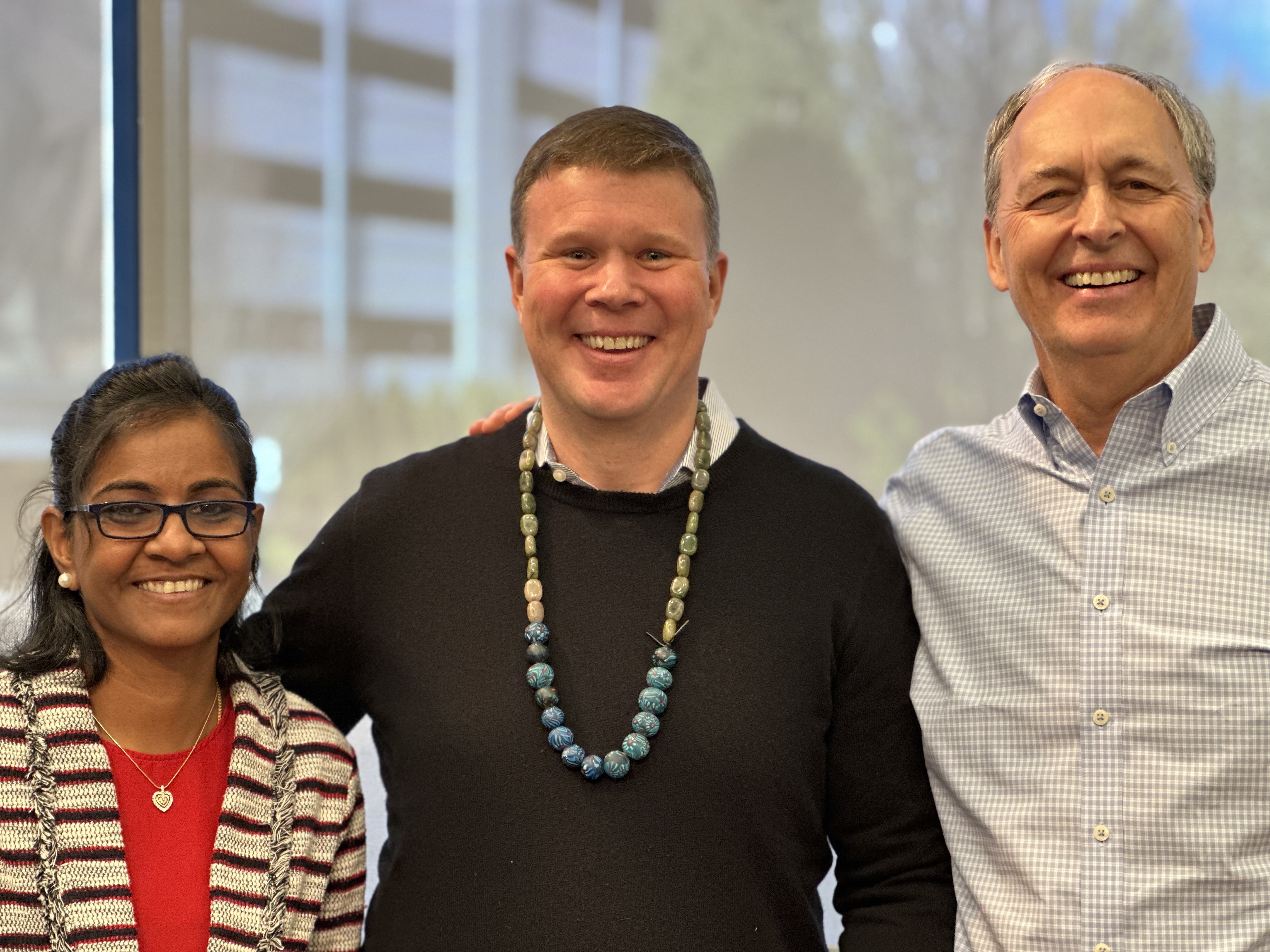Passing The Beads: The Lasting Legacy Of Forrester’s Former President Bill Bluestein
The name Bill Bluestein resonates loudly at Forrester. A storied analyst who later became Forrester’s first president, “Bill Blue,” as he is affectionately known, died unexpectedly in 2001, at just 44. Yet his leadership and research left an indelible mark, and for the past 22 years, the research organization’s most prestigious honor has borne his name.
The Bill Bluestein award is given each year to an analyst whose work is particularly provocative and courageous, that inspires clients and guides their decisions to be great. Unlike other Forrester company awards, the Bill Blue award winner is chosen by a group of peers — specifically, past award winners. It is the final prize given at each year’s company awards ceremony, and there is a palpable excitement before the winner is announced — testaments to both the award’s significance and to Bluestein’s enduring legacy.
“To win this award is a tremendous honor,” says Vice President and Principal Analyst Martha Bennett, who won the award for 2020. “As a Bill Blue award winner, you feel an extra responsibility to live up to the values that the award reflects: courage, collaboration, mastering your topic but then pushing the boundaries of it, and so much more.”
Earlier this year, the award was given to Vice President and Principal Analyst Brandon Purcell, whose research focuses on customer analytics and artificial intelligence — particularly, responsible AI. We’ll get to know more about Purcell and his research shortly. First, we’ll look more closely at the legacy Bill Blue built.
The Birth Of The Bold Call
 Bill Bluestein
Bill BluesteinAs Forrester’s president, Bluestein helped build the company during a time of unprecedented growth. He oversaw its first international expansion in the 1990s and led the transition to digital content delivery.
More than anything else, though, what cemented Bluestein’s legacy was that he taught Forrester analysts how to do research.
“Bill was the one who pushed analysts toward a really pointed what-it-means analysis,” says Forrester founder and CEO George Colony. “In other words, to understand not only what’s going to happen, but if that happens, what does it mean to the economy, to the company, to executives, to people who work in certain roles, to education, to the way we live our lives?” That rigorous process, Colony adds, “led us to some extraordinary insights. It enabled us to see what others could not.”
As an analyst, Bluestein conducted research that was extraordinarily prescient. In 1993, he authored a seminal report, “Defining Social Computing,” that, in essence, predicted the rise of social networking. It depicted a technology-enabled future in which “people will converse more broadly, electronic ‘communities’ will be created, and text, pictures, and sounds will be woven into conversations.” It also predicted that “intelligent phones” would make online messaging and services easier to navigate.
With his research and through his leadership, Bluestein pioneered the bold call, setting the bar for the intellectual courage, conviction, and clarity sought in a Forrester analyst.
“The Greatest Job In The World”
Bluestein also recognized the enormous privilege of being an analyst and the influence that analysts could hold — and made sure others did as well.
“You have the greatest job in the world,” he would tell the research team. “You have the opportunity to do primary research on things everyone else would love to think about. But it’s your job to think about it.”
Bluestein also understood the value of collaboration and that success was a team endeavor. In 1997, he had the idea to give beads to each sales rep, and whenever an analyst helped a salesperson, the analyst would be given a bead. Bluestein, then an analyst, earned the most beads, and made them into a necklace. Today, each annual Bill Blue award winner gets that same beaded necklace to wear for the year (along with a ceremonial blue cashmere scarf to keep). And helpfulness to others throughout the organization figures into the award criteria.
Becoming A Bill Blue
 Forrester CEO George Colony with Bill Bluestein award winner Brandon Purcell
Forrester CEO George Colony with Bill Bluestein award winner Brandon PurcellLike the previous Bill Blue award winners, Brandon Purcell carries forward the values that Bluestein so well embodied.
His research on AI shines a light on a topic whose evolution will have deep and far-reaching impacts, just as Bluestein’s social computing research did. It addresses the complexities of the topic in a way that is thoughtful and accessible.
“What I greatly respect is that Brandon’s responsible AI coverage ranges all the way from the technical to the societal and cultural,” Bennett says, citing as an example the discussions of bias in AI in Purcell’s research. She adds that as a colleague, Purcell is consistently collaborative and supportive. “When I ask him what he thinks of something, he will always take the time to weigh in,” she says. “It’s that sort of collaboration and collegiality that makes our work better.”
Purcell was a Forrester client before joining the company in 2015. In his previous role, with a Bay Area data consultancy, he led a team of data scientists and talked with Forrester frequently about customer analytics.
“There was one analyst who I interacted with quite a bit, and every time I got on the phone with her, I would think, ‘Wow, this person has the best job,’” he recalls. “She got to talk to all of these people and identify what trends were emerging, then write about it and help other people.”
When a job opened for a customer analytics analyst at Forrester (reporting to Srividya Sridharan, the analyst he had been working with), Purcell jumped at the opportunity.
“It was thrilling to be able to take a step back and identify the larger macro trends, and to work with a broad variety of clients,” he says. “As a data science consultant, you’re exposed to only so many different business problems in so many different industries. At Forrester, I could talk to a retailer, a retail bank, a healthcare provider, and a government agency on any given day. I’m consistently amazed by the diversity of clients who are willing to get on the phone with me and be so open about their challenges and where they are in their journey.”
Starting out as a senior analyst covering customer analytics strategies and best practices, Purcell eventually broadened his coverage area to include AI. He credits the Forrester culture and Sridharan, who was his research director until last year, with giving him the space to explore this territory.
“It was a totally new coverage area for me, and it’s been intellectually gratifying for me to have the chance to pursue it,” he says. “And I think it’s actually quite differentiating for Forrester that we have such a deep body of research on this.”
Tapping Both Sides Of The Brain
Another criterion of the Bill Bluestein award — aside from being inspiring, courageous, collaborative, and collegial — is having a clear, compelling writing style. Purcell credits his creative writing major in college as contributing to his success.
“I never thought I’d get to use both of these sides of my brain — the analytical and the creative — together,” he says. “The ability to be creative in the report writing is really what keeps the job fresh for me.”
Purcell’s approach to writing is also methodical and meticulous. “The most challenging, complex, and therefore, most interesting reports I’ve written have required going back to my interview notes and picking out bits and pieces and putting them into a spreadsheet,” he says. “Then I reorganize them into a report structure, and then do the writing. That’s how my mind works.”
This level of rigor combined with a crisp, direct writing style, have been key strengths, says Sridharan. “He’s a very structured thinker; it isn’t hard for him to organize his ideas,” she says. She adds that in writing about AI, Purcell’s focus on client value helped him define a narrow-enough scope for the topic.
“There are many philosophical debates one could have when it comes to AI,” she says. “We needed to define a scope. We weren’t looking to attach ourselves to mainstream conversations and what gets headlines. The research needed to provide tangible advice for our clients, and Brandon understood those parameters.”
Advancing Bill Blue’s Legacy
 Srividya Sridharan, Brandon Purcell, and George Colony
Srividya Sridharan, Brandon Purcell, and George ColonyDespite his facility with words, Purcell briefly struggled to find them when his name was announced as the latest Bill Bluestein award winner.
“It was just so shocking to me,” he says. “It felt so, so very surreal, but also so very meaningful. I’ve looked up to other Bill Blue winners my entire time at Forrester. Some have been mentors to me. In many ways, I’ve tried to model my own role as an analyst on the work they’ve done.”
In keeping with the spirit of the collaboration and collegiality that Bill Blue so deeply prized, Purcell credits those he has worked closely with for helping him achieve this recognition.
“The award goes to analysts, but there’s a whole team of people working alongside us,” he says. “My research directors and peers, who have continually inspired me. The research associates and researchers, who I’ve had the good fortune to work with and watch grow. They all add so much value to everything that they touch.”
Looking ahead, Purcell is eager to continue guiding clients on the adoption of AI technologies and tools, including generative AI.
“I feel very grateful that I’m able to help companies answer thorny questions about the adoption of this new technology, which presents its own kind of ethical challenges,” he says. “I feel a sense of responsibility to help nudge the market in the right direction.”